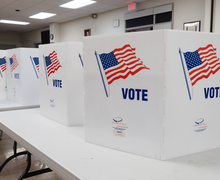Diaz: Administration should listen to the concerns voiced by students when deciding policies
As one semester winds down and the university looks to improve next year’s experience for students on campus, the administration should address the concerns that have already been voiced by current students.
On March 23 Student Association passed two resolutions that have the potential to create a safer and more connected campus community if implemented by the university.
The resolutions passed propose progressive changes to Syracuse University’s class cancellation and class syllabi policies, including taking dangerously freezing temperatures into consideration and heightening the promotion of sexual and relationship violence resources.
In a city notorious for its winters and at a university critiqued for its gaps in communication, the university must move forward with these policies in order to create a safer and more in-sync campus culture for current and future generations of SU students.
At the meeting, SA passed a resolution calling for SU to update its class cancellation policy, urging the university to take subzero temperatures into account, which it currently does not do. This idea has been supported and argued by The Daily Orange Editorial Board.
This past winter in Syracuse proved memorable, marking last February the coldest since 1902. The temperatures during this time plummeted, leaving students having to attend class in freezing conditions with several inches of snow on the ground.
The university administration must acknowledge that the amount of snow on the ground does not coincide with how safe it is for a student to be outside. The presence of severe wind chill and dangerously low temperatures put students’ health at risk and must be taken into account when finalizing class cancellation policies.
In addition to passing the class cancellation resolution, the assembly approved a resolution that would push for the university to include information about sexual and relationship violence resources in class syllabi.
Several universities’ student governments have already acted as leading examples in encouraging university faculty to include assault resources on class syllabi, including Tulane University, which unanimously approved this resolution just last month.
For the SU administration to take the policy a step further, by making it mandatory for this information to be included on class syllabi, is to acknowledge the need for sexual assault resource awareness and prioritize the safety of all students.
Putting this information into the hands of every student works against rape culture and advocates for the victim. Because syllabi pose as a road map that most students will need to consistently refer to all semester long, the administration must take this opportunity to shape the current culture on campus to one that is safer, inclusive and more proactive when it comes to sexual assault.
For the administration to take initiative and implement the resolutions recently passed by the Student Association is to send the message that university administrators are listening to the concerns of students and those of the campus community. From winter safety to sexual assault resource availability, the administration must see these policies as an opportunity to improve the state of our campus in regard to student life and well-being.
Alexa Diaz is a freshman magazine journalism major. Her column appears weekly. She can be reached at adiaz02@syr.edu and followed on Twitter @AlexaLucina.
Published on March 31, 2015 at 11:49 pm






